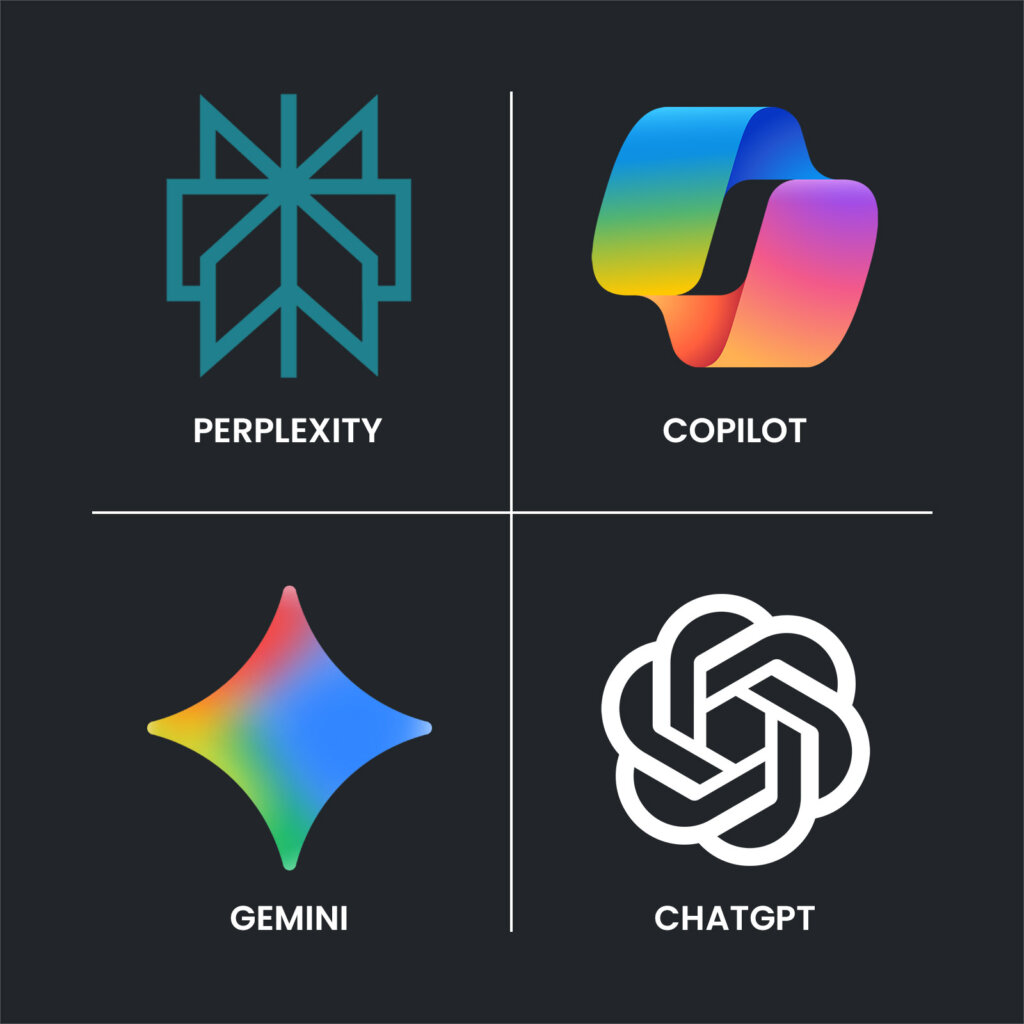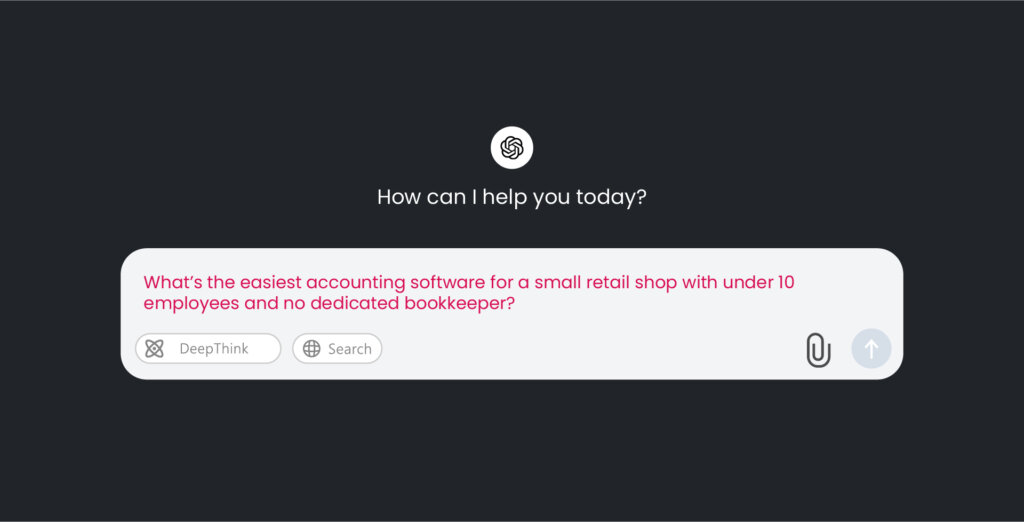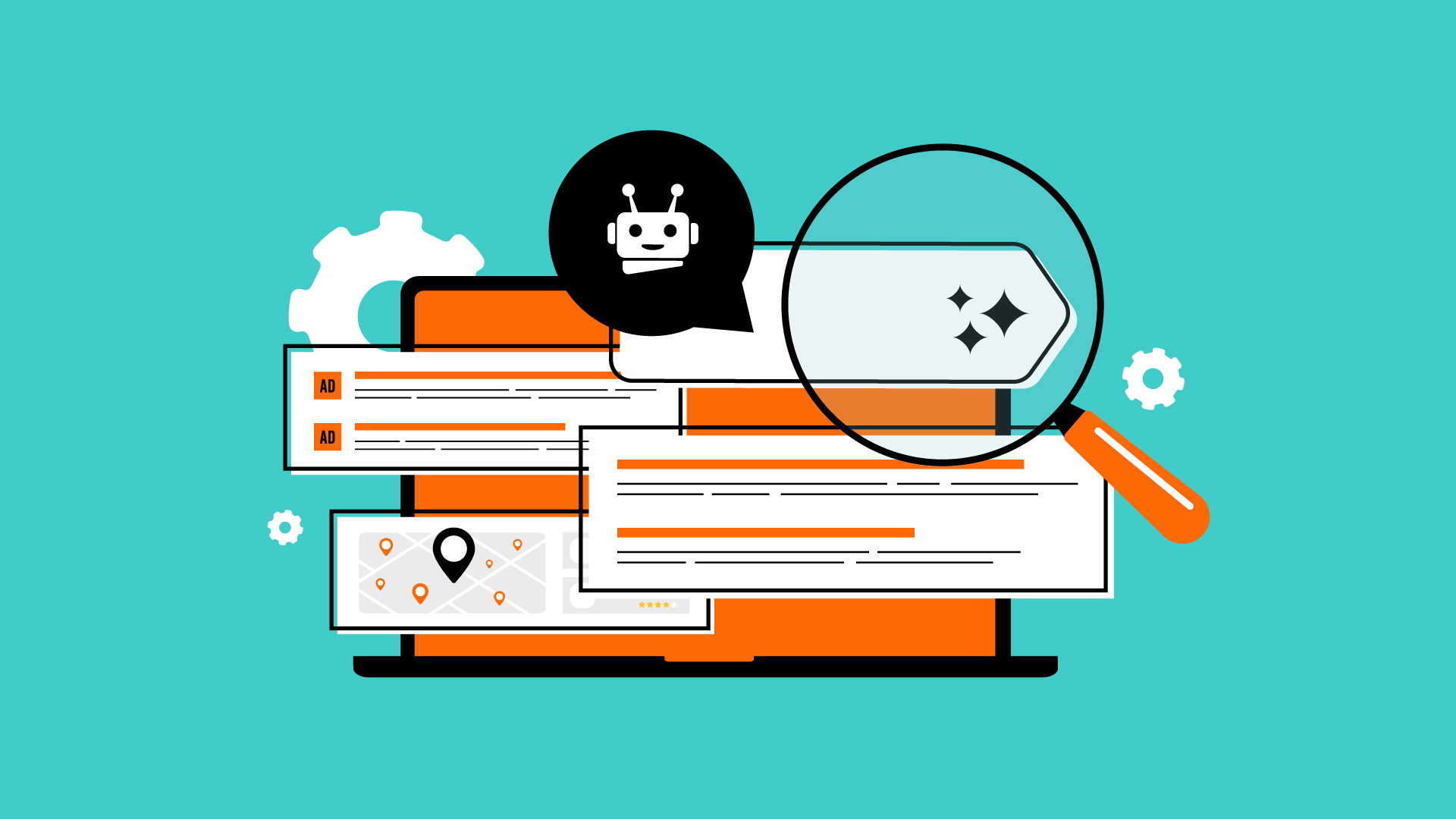AI SEO is about making sure your business shows up when people ask questions in AI-driven search engines like Google’s Search Generative Experience (SGE), Bing Copilot, Perplexity, or ChatGPT. Instead of only optimizing for “blue links,” you’re optimizing to be named, cited, and trusted inside the answers these systems generate.
If your brand isn’t visible there, you risk being skipped over entirely, even if you still rank well in traditional Google results.

And it’s not a fringe behavior anymore. Nearly 3 in 4 Americans now use AI tools for search (AP-NORC), and most describe them as faster, more conversational, and more curated than the old “10 blue links.” From recipes to product comparisons to how-to guides, people are turning to AI because it feels like asking an expert, not sifting through pages of links.
This is why AI SEO matters: your customers are searching differently, and your visibility now depends on whether AI trusts you enough to include your brand in the answer.
Why Traditional Rankings Aren’t Enough Anymore
For years, SEO has been about rankings: get to page one, climb to the top, and you’ll win the click. But AI search is rewriting those rules.
When someone asks Bing Copilot, Perplexity, or ChatGPT a question, the answer they get isn’t a list of links. It’s a synthesized summary pulled from trusted sources, often with a handful of citations. That means two things:
- You could be ranking #1 in search results, but not mentioned in the AI-generated overview at all.
- Or, you could be a smaller brand that doesn’t rank traditionally, but if AI sees you as credible, you get the mention anyway.
In other words, AI SEO is less about positions and more about mentions. The game isn’t only about where you rank, but whether you’re part of the answer.
Quick Stat: 71.5% of people now use AI in search, with 14% doing so daily (Higher Visibility).
That stat says it all: AI-driven answers are no longer optional real estate. They’re where your customers already are.

What Signals Do AI Search Engines Look For?
AI-driven search engines don’t “rank” pages the way Google’s traditional algorithm does. Instead, they pull from sources they trust most to generate answers. That means the signals that matter are less about exact-match keywords and more about credibility, clarity, and coverage.
Authority & Trust (E-E-A-T)
Google, Bing, and AI search engines all lean heavily on experience, expertise, authoritativeness, and trustworthiness (E-E-A-T). If your brand consistently demonstrates expertise (through blog content, author bios, case studies, or third-party recognition), you’re far more likely to be cited as a reliable source.
Think of it this way: AI won’t risk quoting a random site. It wants to sound authoritative, so it leans on the most credible voices in the room.
Mentions Across the Web
One of the strongest signals for AI search visibility is how often your brand gets mentioned — not just on your own site, but across the broader web. News articles, press releases, customer reviews, podcast appearances, and even social media posts all contribute.
If AI sees your name consistently in conversations around a topic, it’s more likely to include you when generating an answer. In other words, citations aren’t just nice PR wins; they’re a core AI search optimization lever.
Entity Clarity with Schema
AI search engines think in entities (people, companies, products, places), not just strings of keywords. Using structured data like schema markup helps define your brand as a clear, recognized entity. This can mean marking up your business details, FAQs, product data, or reviews so machines know exactly who you are and what you do.
The clearer the signal, the harder it is for AI to confuse you with someone else.
Content AI Can Read (FAQs, Lists, Clear Answers)
Unlike traditional SEO, which rewarded long, keyword-rich posts, AI systems prefer content that’s structured and easy to parse. FAQs, step-by-step lists, and short direct answers are more likely to be pulled into AI responses because they’re straightforward and machine-friendly.
If you want to appear in AI summaries, give the AI content it can digest quickly, not walls of jargon or fluff.
How to Optimize for AI Searches (Step-by-Step)
AI SEO can sound overwhelming, but it comes down to building visibility in the places AI pulls from most. Here’s a practical roadmap:
- Audit Your Mentions
Search for your brand in Bing Copilot, Perplexity, and Google Gemini. See if you’re cited in AI responses. If not, make note of which competitors are showing up. - Fix Schema & Business Profiles
Clean up your schema markup (organization, FAQ, reviews). Update Google Business Profile, Bing Places, and industry directories. The more consistent your presence, the easier it is for AI to recognize and cite you. - Generate Mentions
Earn citations through reviews, press releases, directories, Reddit, and Quora discussions. Anywhere your brand is discussed, AI can potentially pick it up as a trust signal. - Add FAQs & Q&A Content
Publish FAQ pages and embed Q&A sections in blogs and product pages. Consider adding an llms.txt file to guide how AI scrapers interpret your content. - Go Multimodal
AI isn’t just text-based anymore. Use alt text, captions, and transcripts to make images, video, and audio searchable and accessible. These help AI understand your content across formats. - Use Natural Keywords
Work in phrases like “optimize website for AI search” and “SEO for AI search” where they fit naturally. These queries are rising fast and help align your content with how real users are asking questions.
AI SEO vs. Traditional SEO (And Why You Need Both)
It’s tempting to frame AI SEO as “the new SEO,” but that’s not quite right. The truth is: AI SEO and traditional SEO work best together. One doesn’t replace the other — they layer.
Here’s how they complement each other:
- Local Search → Reviews, GBP, and Directories
If you’re a local business, traditional SEO ensures your Google Business Profile and Yelp listings are optimized. AI SEO builds on that by emphasizing reviews, ratings, and consistent mentions across local directories, the signals AI uses to recommend you when users ask “What’s the best [business type] near me?” - National Search → E-E-A-T, Schema, and PR Mentions
At the broader level, traditional SEO leans on technical optimization, content, and backlinks. AI SEO takes those same elements but shifts the focus: schema for clear entity recognition, E-E-A-T for credibility, and PR mentions for wider authority.
This layered approach is sometimes called Answer Engine Optimization (AEO) because instead of only optimizing for search engines, you’re optimizing to be part of AI-driven answers.
The bottom line? Ranking is still important, but it’s no longer the whole picture. To future-proof your visibility, you need both SEO for rankings and AI SEO for mentions working in tandem.
Do You Need AI SEO Services?
If you’ve been asking whether your brand is showing up in AI search or worried you’re falling behind, this is where an AI SEO agency can help.
The right AI SEO services go beyond rankings. They include:
- Monitoring where (and if) your brand is being cited in tools like Bing Copilot, Perplexity, and Google Gemini.
- Optimization of schema, business profiles, reviews, and FAQs so AI systems recognize and trust your brand.
- Growth through PR mentions, directory listings, and community visibility (Reddit, Quora, industry forums).
It’s about keeping your business visible not just today, but in the way people are searching tomorrow.
Final Thoughts: Future-Proofing with AI Search Optimization
AI search isn’t a passing trend. It’s already how millions of people get answers. The good news? It’s not too late. Brands that act now can secure visibility while competitors are still figuring it out.
Early movers win. And with the right strategy, you don’t just adapt to AI search, you thrive in it.


